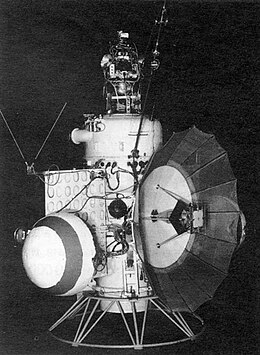 | |||
| Manufacturer | OKB-1 | ||
|---|---|---|---|
| Country of origin | Soviet Union | ||
| Operator | Soviet Space Program | ||
| |||
The 2MV planetary probe (short for 2nd generation Mars-Venus) is a designation for a common design used by early Soviet uncrewed probes to Mars and Venus. [1]
It was an incremental improvement of earlier 1MV probes and was used for the Venera 5 and Venera 6 missions to Venus. [1] [2] It was standard practice of the Soviet space program to use standardized components as much as possible.
All probes shared the same general characteristics and differed only in equipment necessary for specific missions. [3] Each probe also incorporated improvements based on experience with earlier missions.
It was superseded by the 3MV family.
Design
The probe consisted of three primary parts.
Orbital Compartment
The core of the stack was a pressurized compartment called the Orbital Compartment measuring 2.1 meters with a diameter of 1.1 meters. Also mounted on the Orbital Compartment was a parabolic high-gain antenna, used for long-range communications.
Payloads
Depending on the mission, the probe would carry specific instruments or a detachable landing module. [3]
Engine
Course correction capabilities were provided by a KDU-414 engine attached to the top of the Orbital Compartment.
Variants
- 2MV-1: Venera 2MV-1 No.1 (Sputnik 19), Venera 2MV-1 No.2 (Sputnik 20) [4]
- 2MV-2: Venera 2MV-2 No.1 (Sputnik 21) [5]
- 2MV-4: Mars 2MV-4 No.1 (Sputnik 22), Mars 1 (Mars 2MV-4 or Sputnik 21) [6]
- 2MV-3: Mars 2MV-3 No.1 (Sputnik 24) [7]
- 2V (V-69): Venera 5 (2V (V-69) No.330), Venera 6 (2V (V-69) No.331) [2]
See also
References
- ^ a b "2MV". www.astronautix.com. Archived from the original on 8 March 2016.
- ^ a b "Venera 5, 6 (V-69 #1, 2)". Gunter's Space Page. Retrieved 2023-09-25.
- ^ a b Ulivi, Paolo; Harland, David M. (2007-12-08). Robotic Exploration of the Solar System: Part I: The Golden Age 1957-1982. Springer. ISBN 9780387739830.
- ^ "Venera (2a), (2b) (2MV-1 #1, 2)". Gunter's Space Page. Retrieved 2023-09-25.
- ^ "Venera (2c) (2MV-2 #1)". Gunter's Space Page. Retrieved 2023-09-25.
- ^ "Mars 1 (2MV-4 #1, 2)". Gunter's Space Page. Retrieved 2023-09-25.
- ^ "Mars (2a) (2MV-3 #1)". Gunter's Space Page. Retrieved 2023-09-25.
